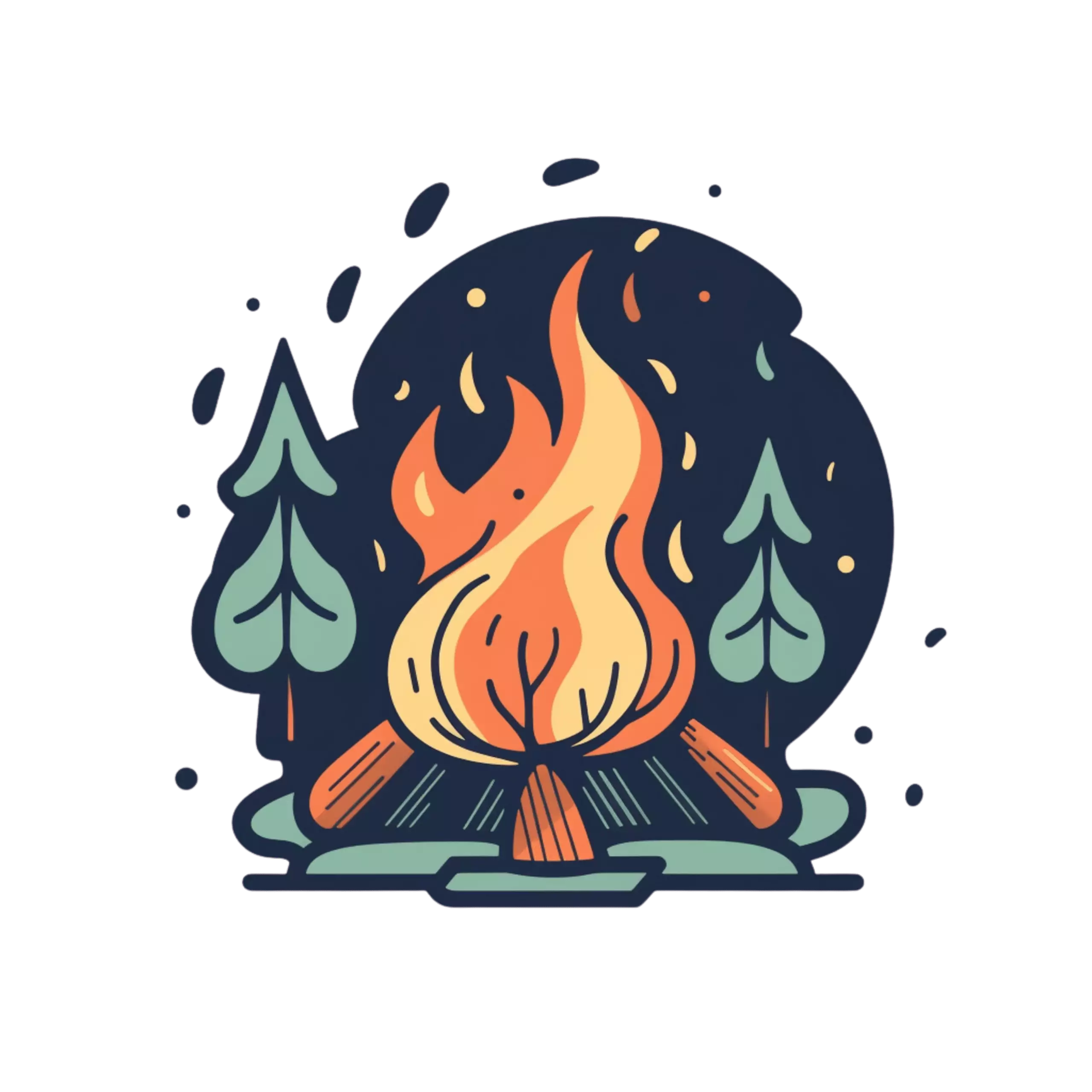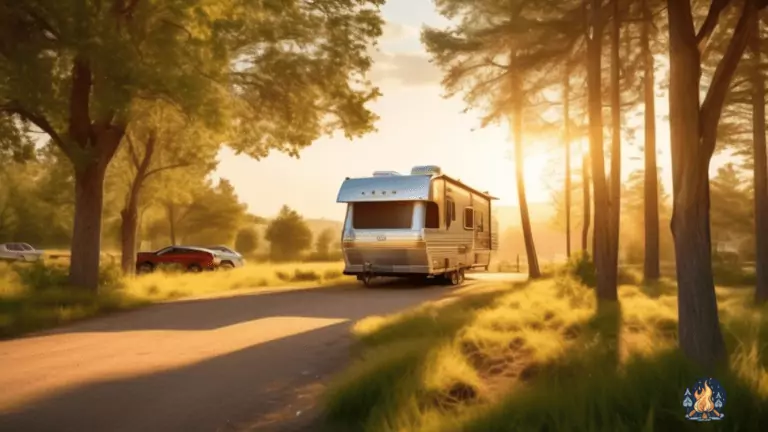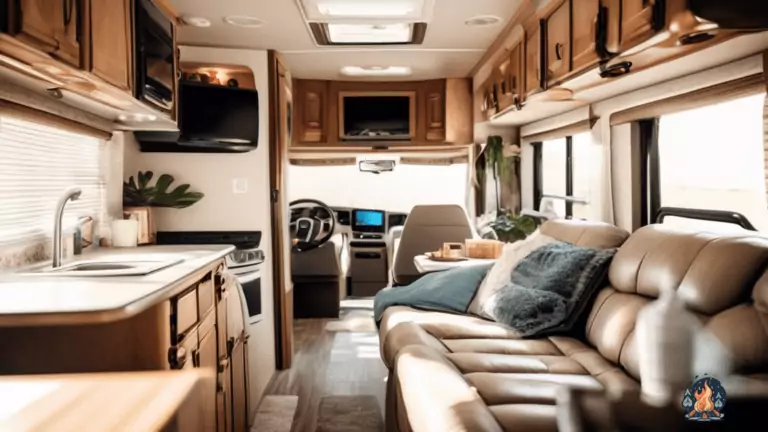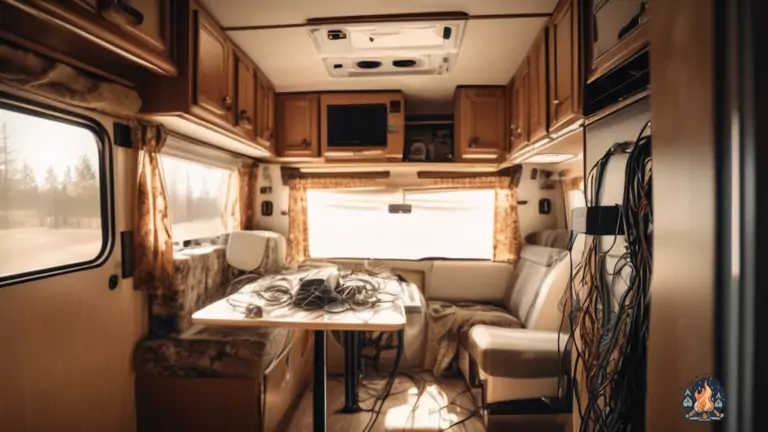Essential RV Cooking Safety Tips To Keep In Mind
by Kevin Fairbanks • Updated: January 21, 2024
Cooking in an RV? Learn the essential safety tips to protect yourself and your loved ones. Click now for crucial RV cooking safety guidelines to ensure a worry-free trip!
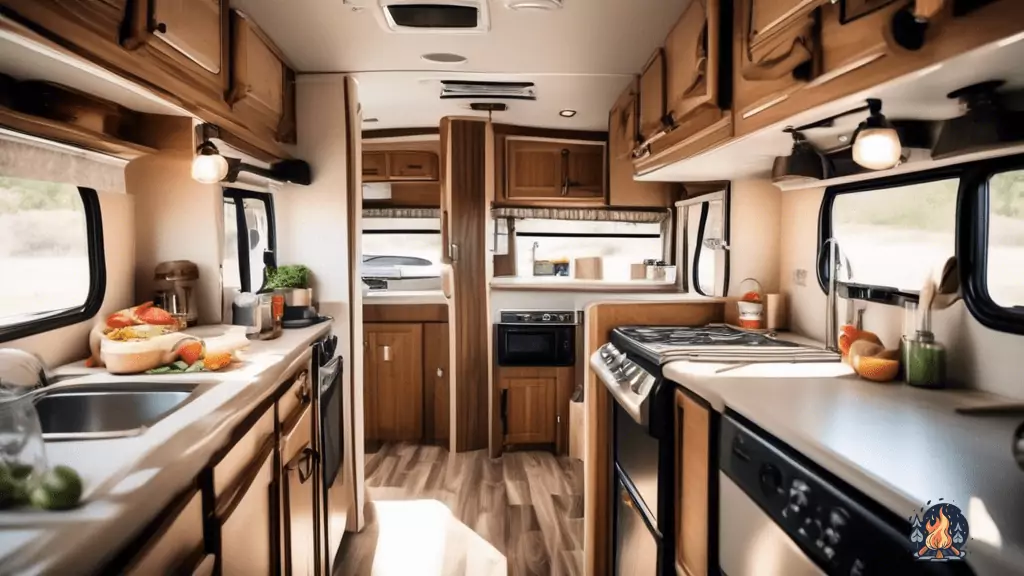
You’re on the road, exploring new destinations in your trusty RV. The sights, the sounds, the adventurous spirit – it’s all part of the thrilling experience.
But amidst all the excitement and adventure, it’s important to remember that safety should always be a top priority, especially when it comes to cooking in your RV. Coincidentally, we’ve got some essential RV cooking safety tips that will help ensure your culinary adventures don’t turn into fiery disasters.
Now, let’s talk propane. You and propane are like two peas in a pod – it’s the fuel that powers your cooking appliances and keeps your meals sizzling.
But it’s crucial to use it properly to avoid any unwanted surprises. Make sure you always check for leaks before using your propane system and never store propane cylinders indoors. And hey, while you’re at it, keep a fire extinguisher nearby, just in case things get a little too hot to handle.
Remember, safety first, and your RV cooking experiences will be smooth sailing!
Proper Propane Usage and Safety
When using propane for cooking in your RV, remember to always check the connections for any leaks or damage before igniting the stove, ensuring both your safety and the efficient use of propane. Don’t worry about the inconvenience of checking for leaks, as it only takes a few minutes and can prevent potential hazards.
Plus, who doesn’t love the thrill of playing detective and searching for tiny gas leaks? It’s like being in your very own RV-themed episode of CSI: Propane Investigation Unit. So grab your trusty soap and water solution and get ready to hunt down those sneaky bubbles that could be a sign of a leak.
And remember, finding leaks isn’t just about safety, it’s also about saving money. Because why waste precious propane when you could be using it to cook up a delicious feast that would make Gordon Ramsay proud?
But wait, there’s more!
In addition to checking for leaks, it’s important to ensure that your propane tank is properly secured. You don’t want that bad boy rolling around in your RV like a loose cannon. Trust me, you don’t want to be cooking up a storm and suddenly have your tank decide to go on a joyride, taking your dinner plans with it. So take a moment to make sure your tank is securely fastened and won’t go rogue on you.
And while we’re on the subject of propane tanks, remember to store them in a well-ventilated area. You don’t want to be trapped in a tiny RV with a gas bomb waiting to go off. That’s not exactly the cozy camping experience you had in mind, is it? So keep those tanks happy and well-ventilated, and you’ll be cooking up a storm in no time.
Fire Prevention and Extinguisher Placement
To ensure a delightful cooking experience, make sure you have the fire prevention measures in place and the extinguisher easily accessible.
Now, I know what you’re thinking, "Do I really need to worry about a fire in my cozy little RV kitchen?" Well, my friend, let me tell you, accidents happen, and you don’t want your cooking adventure turning into a full-blown bonfire. So, let’s talk about some fire prevention tips that will keep your meals sizzling without the risk of burning down the whole campground.
First and foremost, keep those flammable items far away from your cooking area. I’m talking about paper towels, dishcloths, and any other combustible materials. Trust me, you don’t want your dish towel going up in flames while you’re trying to flip that perfectly grilled burger.
And while we’re on the topic of grilling, always make sure to clean your grill after each use. Grease buildup can easily ignite and turn your cooking session into a fireworks display. So, grab that grill brush and get scrubbing!
Now, let’s talk extinguishers. You definitely want one of those bad boys within arm’s reach of your kitchen. I know it’s tempting to use the extinguisher as a prop for your impromptu magic show, but believe me, it’s not just for show. In case of a small fire, you’ll want to be able to grab that extinguisher and put it out before it becomes a raging inferno.
So, find a convenient spot for it, like under the sink or near the stove, and make sure it’s easily accessible. And remember, if you do need to use it, aim for the base of the fire, not your significant other who’s panicking and running around like a headless chicken. Safety first, my friend!
Ventilation and Carbon Monoxide Detection
Make sure you have proper ventilation and carbon monoxide detection in place to ensure a safe cooking experience in your RV. Cooking in a confined space like an RV can lead to the build-up of smoke, steam, and other unpleasant odors.
To avoid feeling like you’re trapped in a hot, smelly box, here are a few tips to keep the air flowing and the carbon monoxide at bay:
- Open a window or use the RV vent fan. This may seem obvious, but you’d be surprised how many people forget to crack a window or turn on the vent fan while cooking. Not only will this help remove any lingering smells, but it will also prevent the build-up of steam and smoke.
- Invest in a carbon monoxide detector. Carbon monoxide is a silent killer, and since RVs are small, enclosed spaces, it’s crucial to have a detector in place. This little device will alert you if there are dangerous levels of carbon monoxide present, giving you enough time to evacuate and seek help.
- Clean your stove hood and exhaust fan regularly. Over time, grease and grime can build up in your stove hood and exhaust fan, reducing their efficiency. Make sure to clean them regularly to ensure that they can effectively remove smoke and fumes from your cooking area.
Remember, proper ventilation and carbon monoxide detection are not only essential for your safety but also for the well-being of everyone traveling with you in the RV. So, crack a window, turn on the fan, and keep that carbon monoxide detector handy to enjoy a worry-free cooking experience on your adventures.
Safe Stovetop and Oven Cooking Techniques
One important aspect of safe stovetop and oven cooking techniques is being mindful of the heat distribution and adjusting the temperature accordingly. When you’re cooking in an RV, it’s like playing a game of culinary Tetris. You’ve got limited space and heat sources, so it’s important to make sure that your food is cooking evenly. Nobody wants a burnt pancake on one side and a raw pancake on the other.
So, keep an eye on the heat distribution and adjust the temperature as needed. And hey, if you end up with a pancake that looks like it belongs in a modern art museum, just call it avant-garde breakfast cuisine and serve it with a side of humor!
Now, let’s talk about oven cooking. When you’re using the oven in your RV, it’s crucial to remember that it’s not like the fancy ovens you see on cooking shows. It may not have the same level of precision and temperature control. So, you’ve got to be a little more intuitive with your cooking. Keep an eye on your food, use a thermometer if needed, and don’t be afraid to make adjustments along the way.
And if your casserole ends up looking a little more "rustic" than you intended, just call it a rustic masterpiece and embrace the imperfections. After all, cooking in an RV is all about embracing the adventure, even if it means your food doesn’t always turn out picture-perfect.
Food Storage and Handling in an RV
Storing and handling food in an RV can be a challenge, but it’s important to do so safely. Let’s face it, you don’t want your road trip turning into a food poisoning adventure, do you?
First things first, make sure you have enough space in your tiny fridge to store all your goodies. It might be tempting to cram everything in there like a game of refrigerator Tetris, but trust me, it’s not worth the risk of food getting spoiled. And please, for the love of all things delicious, don’t forget to check the expiration dates! I know, I know, it’s easy to lose track of time when you’re living the RV life, but that jar of mayo from 2017 has got to go.
Now, when it comes to handling food, you need to be a master of cleanliness. Wash those hands like you’re about to perform brain surgery, my friend. And don’t forget to sanitize your cooking utensils and surfaces regularly. We don’t want any unwanted bacteria hitching a ride on our meals, right?
Oh, and one more thing, when you’re out on the road, it’s important to keep your groceries secure. Trust me, you don’t want a rogue container of spaghetti sauce exploding all over your cozy little home on wheels. So, make sure everything is tightly sealed and stowed away properly. Your taste buds and your RV will thank you for it.
Frequently Asked Questions
Can I use propane for heating inside the RV?
Sure, you can use propane for heating inside the RV, but safety is key! Make sure to properly ventilate, check for leaks, and keep flammable items far away. We don’t want any u0026quot;hotu0026quot; situations, do we? Stay safe and warm!
How often should I test my carbon monoxide detector?
You should test your carbon monoxide detector at least once a month to ensure it’s working properly. Picture yourself confidently pressing the test button, knowing you’re keeping your RV safe from this silent killer.
Are there any specific foods that should not be stored in the RV?
When it comes to RV storage, keep your fridge away from these troublemakers: raw meat, fish, and eggs. They can spoil faster and turn your RV into a stinky disaster. Nobody wants that!
Can I use the oven for storage when not in use?
No, you can’t use the oven for storage when not in use. It’s like turning your kitchen into a closet. Plus, it’s a safety hazard. Keep the oven for cooking delicious meals and use proper storage solutions for everything else. Stay safe and organized!
What are some common fire hazards to be aware of while cooking in an RV?
When cooking in an RV, be aware of common fire hazards like grease buildup, loose clothing, and flammable materials nearby. Remember, your meals should be hot, but your RV should definitely not be! Stay safe and keep the flames where they belong – in the kitchen!

Hi, I’m Kevin, a lifelong camping enthusiast and the voice behind Campfire Discoveries. From tent to RV to cabin camping, I’ve explored it all. Join me as we share stories and tips around the campfire, deepening our connection with the great outdoors.
Keep Reading
-
Embrace The Freedom Of RV Living
Experience the thrill of RV living and unlock a world of freedom on the road. Embrace new horizons, create lasting memories, and start your ultimate adventure today! Click here to begin your journey into the world of RV living.
-
Essential Tips For RV Heating System Maintenance
Keep your RV cozy and worry-free with these essential tips for RV heating system maintenance. Don’t miss out on staying warm during your travels! Click here to learn more.
-
Common Issues With RV Electrical Systems And How To Troubleshoot
Feeling powerless in your RV due to electrical problems? Learn the common issues and troubleshoot your RV electrical system now! Get back on track for your adventure by clicking here.
